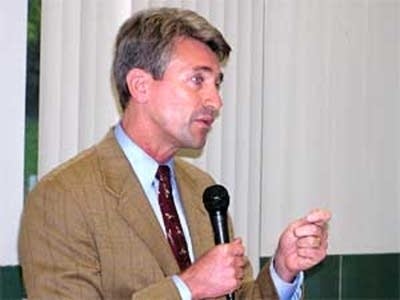Rybak takes Safe City plan to northside

A day after Minneapolis Mayor R.T. Rybak announced his new crime fighting strategy in front of the City Council he's come to the Hawthorne neighborhood in north Minneapolis to talk and listen to about 100 people. They've gathered at Farview Park for the monthly Hawthorne Huddle, hosted by Ellen Luger of the General Mills foundation.
Rybak and interim Police Chief Tim Dolan brought their plan directly to the north side because this part of town has seen more crime than most. The majority of the city's homicides have occurred here. Robberies are up 66 percent and aggravated assaults have gone up nearly 40 percent over this time last year.
Rybak outlined his plans for north Minneapolis in his state of the city address last month and says the Safe City Initiative follows through on his promise.
The police work really hard. There's no doubt about it. There's not enough of them.
"We have public safety challenges in every part of Minneapolis," says Rybak. "And the plan that we've laid out is for every part of Minneapolis but as I said before the City Council and as I've said in every part of town, north Minneapolis is number one."
Create a More Connected Minnesota
MPR News is your trusted resource for the news you need. With your support, MPR News brings accessible, courageous journalism and authentic conversation to everyone - free of paywalls and barriers. Your gift makes a difference.
The initiative calls for more police presence - meaning more squad cars on the street and more officers walking a beat or riding a bicycle. The money for the officers and other measures will come from a $2 million grant from the state and $2 million more from the police budget.
Safe City also involves crime prevention measures, such as funding programs designed to keep kids from joining gangs.
Rybak says an alarming trend in the latest crime figures is an increase in crimes perpetrated by young people. In fact, police officials say one of the suspects in a recent rash of north side arson fires is nine years old.
Rybak's plan includes money for summer employment opportunities for youth, and services including career centers in high schools.
Some audience members, like Doris Cunningham, a youth specialist for the Park Board, say getting jobs for young people is one of the best ways to keep them out of trouble.
"I work with gang members. And these youth say, 'Ms. Doris, I need a job.' Well half the jobs, they're going to give to some of these youth, but a lot of these youth - the ones that really need a job - aren't getting them," says Cunningham. "So that's what we need."
The presentation by the mayor and other city officials was received warmly by most of the meeting participants. But some who've lived in the neighborhood for awhile are encouraged, but cautious.
"We're a neighborhood under siege," says Carrie Howell. "And we've been under siege for years."
Howell has lived in Hawthorne for 15 years and is a boardmember of the Hawthorne Area Community Council. She says she regularly has to shoo drug dealers and their customers away from the front of her house. And Howell says she's happy when she can drive home and not see crime scene tape nearby.
She says probably the most important part of the Safe City Initiative is putting more cops on the street.
"The police work really hard. There's no doubt about it. There's not enough of them," she says. "And in this neighborhood, there's just too much going on. You can hardly keep a lid on it. And I understand that. And when you call 911, they triage calls. They have to."
Howell says help from the police is crucial, but residents of the neighborhood have to stay involved as well. She says sometimes it's hard to find the energy to work on the myriad problems that plague the area. But Howell says it just has to be done.
"We are, in a very real sense, as a neighborhood, responsible for our problems because we don't stand up and say this is not OK," says Howell. "But no one wants to hear hardly because it shifts the blame back on us ... but it also shifts the power back on us. We have power and we don't use it."
The Safe City Initiative also encourages more corporate and citizen cooperation with police efforts. More specifically, Rybak told meeting participants that they might have to 'stick their noses into other people's business' to help send the message that bad behavior won't be tolerated.
